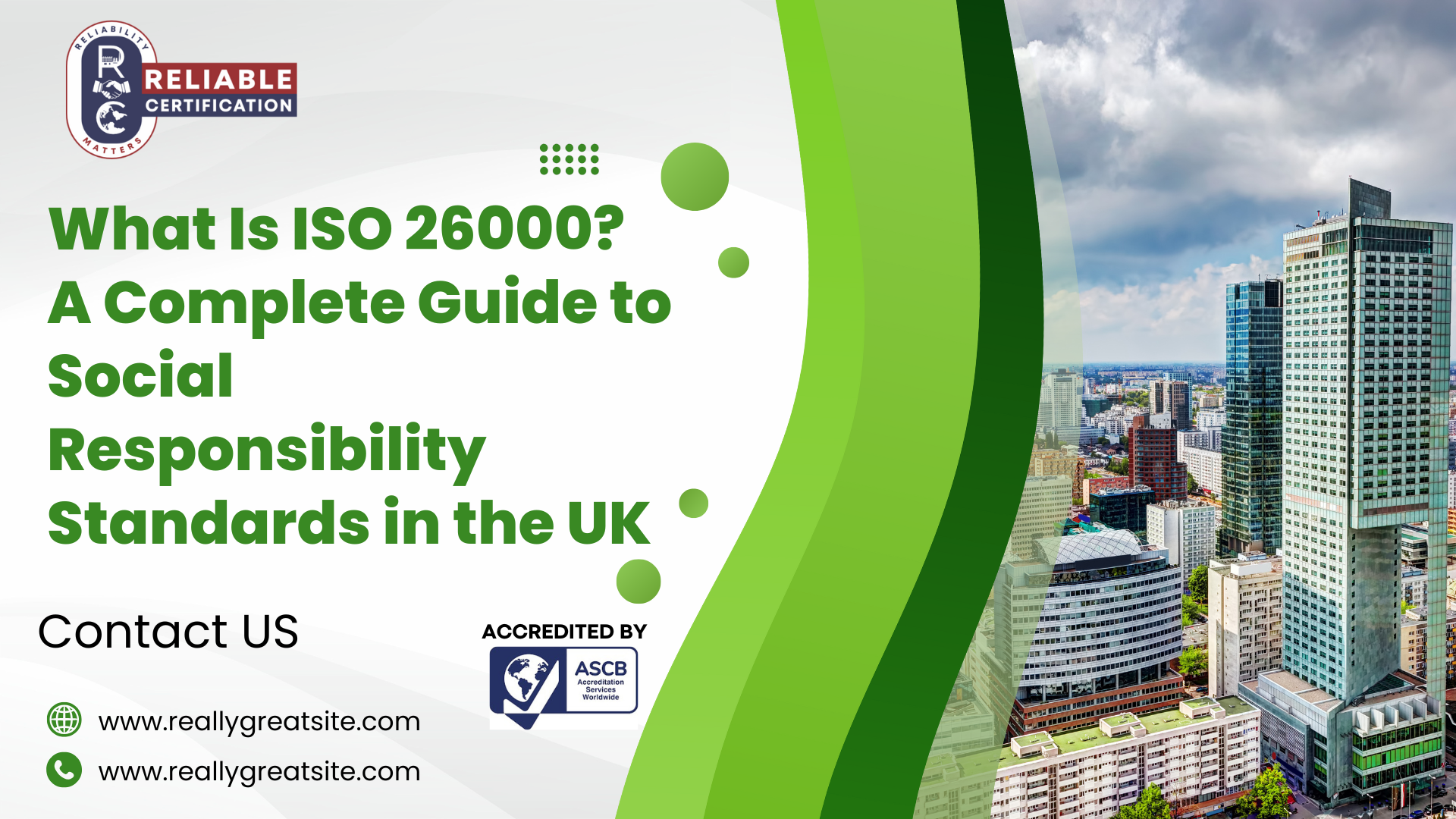ISO 26000 Certification offers businesses a disciplined framework for applying social responsibility practices benefiting their operations, stakeholders, and the larger society. Businesses can improve their reputation, reduce risks, and promote long-term sustainability by matching with this internationally acknowledged criteria. Adopting ISO 26000 is a calculated move toward being a socially conscious company that not only satisfies the needs of the ethical customer of today but also helps to create a fair, sustainable future for everybody.
 ISO 26000
Social Compliance
ISO 26000
Social Compliance
By submitting your information, you are agreeing to our Terms & Conditions and our Privacy Policy.
Developed by the International Organization for Standardization (ISO), ISO 26000 is a worldwide recognized standard offering direction on social responsibility. Unlike conventional certifications that concentrate on compliance, ISO 26000 is a guideline framework meant to help companies in including ethical and socially responsible practices into their operations, independent of size, industry, or location. Originally unveiled in 2010, ISO 26000 has now grown to be an essential instrument for companies trying to show their dedication to sustainability.
Important areas including organizational governance, human rights, labor practices, environmental sustainability, consumer issues, fair operating practices, and community involvement are covered by this certification. It provides a structure that companies can use to match their business plans with worldwide sustainability objectives, therefore promoting an ethical approach to operations, governance, and involvement of stakeholders.
The main objective of ISO 26000 Certification is to give businesses a thorough and practical structure to direct their social responsibility projects. Certification reveals that a company is dedicated to match its activities with worldwide sustainable development goals and enhance its social, environmental, and financial influence. ISO 26000 specifically seeks to help companies adopt ethical and sustainable business practices by offering unambiguous rules that include social responsibility into regular operations.
Getting ISO 26000 Certification will help a company in many different ways, improving many facets of its operations, reputation, and contacts with stakeholders. These comprise:
Improved Reputation and Public Image: ISO 26000 Certification is a clear indication of an organizations ethical policy dedication. It improves the public image of the company by helping to establish it as a conscientious company that supports ethical behavior, sustainability, and stakeholder welfare.
Stronger Stakeholder Relationships: Transparency and responsibility are fundamental values of ISO 26000, which shows that the company is acting significantly to address issues of labor rights, environmental sustainability, or community involvement, so strengthening relationships with stakeholders.
Sustainability Alignment: Adopting ISO 26000 helps companies to be more suited to match their activities with the Sustainable Development Goals (SDGs) of the United Nations. Businesses may help to create a more fair and sustainable world by lowering their environmental impact and endorsing social fairness.
Competitive Advantage: ISO 26000 Certification provides your company a unique competitive edge as more customers and companies give ethical and social responsibility practices top priority. It sets you apart from rivals and draws business partners and consumers with like ideals.
Enhanced Employee Engagement: Implementing ISO 26000 will probably help companies to increase employee happiness and involvement. Emphasizing moral work ethics, diversity, and community service helps to create a better working environment that results in better employee retention and output.
Risk Management: Incorporating ISO 26000 ideas can help companies better spot and reduce social and environmental risk. By means of this proactive strategy, legal or reputational concerns can be avoided, thereby ensuring that the company stays compliant with ethical norms and legislation.
Market Expansion: Certification in ISO 26000 creates chances for worldwide alliances and business development. Many worldwide markets, especially in Europe and Asia, demand enterprises to follow ethical standards, hence ISO 26000 is a useful instrument for those wishing to enter new markets.
Regulatory Compliance: Adopting ISO 26000 would assist companies guarantee they follow local and international rules, therefore lowering the risk of penalties, legal obligations, or unfavorable publicity resulting from non-compliance.
Prices to gain ISO 26000 certification will vary based on the size and complexity of your business.
To receive your personalised quote, simply fill in your details in our form above.
Complete the form to receive your instant quote
Prefer to talk face-to-face? If you’d prefer a no-obligation video conference call, please call 0231613720
Organizations seeking ISO 26000 Certification have to show that their operations and governance are including social responsibility concepts. Although ISO 26000 does not call for official audits or compliance checks unlike other certifications, companies must fulfill specific criteria to indicate their dedication to social responsibility. These contain:
Top Management Commitment: Leaders have to be obviously committed to include social responsibility into the principles and plans of the company. Driving transformation and ensuring social responsibility takes front stage in the company depend on top managements cooperation.
Stakeholder Engagement: Engaging stakeholders including employees, consumers, suppliers, and community members helps one to grasp their requirements, expectations, and worries. Including stakeholders helps companies create winning plans fit for their interests.
Gap Analysis: Organizations have to assess their present social responsibility strategies and find holes in them. By helping to identify areas needing development, a comprehensive assessment will enable companies to concentrate their efforts on those areas compliant with ISO 26000 criteria.
Policy Development: It is imperative to create and record policies displaying a dedication to social consciousness. These rules ought to address labor practices, environmental preservation, ethical operating guidelines, and community involvement.
Employee Training and Awareness: Employees at all levels should get training to grasp the ideas of social responsibility and how they support the objectives of the company so as to ensure the effective application of ISO 26000.
Operational Integration: Daily activities of the company have to include social responsibility. From procurement and supply chain management to human resources and marketing, including sustainability practices into corporate processes helps one to accomplish this.
Monitoring and Reporting: Organizations have to set up methods to track their social responsibility performance. This covers defining specific goals, gathering information, and routinely checking development toward social responsibility targets.
Continual Improvement: ISO 26000 challenges companies to embrace a constant improvement strategy. Policies and procedures should be improved by means of regular audits and feedback loops so as to strengthen social responsibility results. declared values and commitments.
With the help of Reliable Certification, the certification process can take as little as 45 days to complete
Unlike other certifications, ISO 26000 is a guidance framework, offering advice on integrating ethical practices without mandatory compliance audits.
The standard covers seven key areas: governance, human rights, labor practices, environmental impact, fair operating practices, consumer issues, and community involvement.
Yes, ISO 26000 can complement other standards such as ISO 9001 (Quality Management) and ISO 14001 (Environmental Management).
Implementation time varies, typically taking 3 to 6 months depending on the organization’s size and readiness.
No, ISO 26000 is a voluntary standard that organizations adopt to demonstrate their commitment to sustainability.
Any organization, regardless of industry or size, can apply for ISO 26000 Certification.
ISO 26000 Certification recognizes an organization’s adherence to social responsibility principles
 What Is ISO 26000? A Complete Guide to Social Responsibility Standards in the UK
What Is ISO 26000? A Complete Guide to Social Responsibility Standards in the UK
Learn how ISO 26000 helps UK businesses act ethically and responsibly. A simple guide to social responsibility, benefits, and implementation tips.
Typically replies within 30 minutes